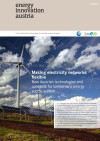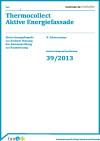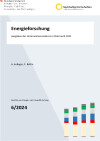Suchergebnisse
Tage des Passivhauses 2017
10. - 12. November 2017
Österreichweit, AT
Eine Gelegenheit weltweit Passivhäuser zu besichtigen. Besuchen Sie ein Passivhaus in Ihrer Nähe und lernen Sie aus den Erfahrungen der Bewohner.
Eco Fashion - Der Stoff aus dem die Zukunft ist
Forschungsergebnisse zum Thema Eco Fashion: von der Faser über die Farbe bis zu den neuen trendigen Modelabeln und der richtigen Kennzeichnung für KonsumentInnen.
Neues Highlight "Kritische Rohstoffe"
Vorstellung der Zwischenergebnisse der Studie "Kritische Rohstoffe für Hochtechnologieanwendungen" in Österreich sowie relevanter nationaler und internationaler Projekte und Publikationen. Es gibt auch einen Überblick über die wichtigsten Aktivitäten des BMVIT sowie Veranstaltungen zum Thema.
Photovoltaik Roadmap für Österreich
Arsenal Research erarbeitet unter der Projektleitung von DI Hubert Fechner MAS eine Photovoltaik Roadmap für Österreich. Ein erster Zwischenstand wird bei der 4. Österreichischen Photovoltaiktagung am 30. und 31. August 2006 präsentiert.
"Haus der Zukunft"-Symposium
28. Juni 2016
TUtheSky, Getreidemarkt 91060 Wien, AT
Im Rahmen des Symposiums 2016 lud das Forschungs- und Innovationsprogramm "Haus der Zukunft" mit einem Festvortrag und Diskussionsrunden zum Ausblick in die Zukunft des nachhaltigen Bauens und warf mit der Vorstellung der Programm-Evaluierung auch einen Blick zurück auf bisher Geleistetes und vorliegende Ergebnisse.
Vienna R20 Student Event
31. Jänner 2013
Österreichische Nationalbibliothek, Josefsplatz 11010 Wien, AT
Gestalte Deine Welt von morgen - nachhaltig.innovativ.zukunftsfähig: Exklusiv für StudentInnen präsentiert Arnold Schwarzenegger seine Lösungen für den weltweiten Klimaschutz und neue Allianzen zwischen Wirtschaft und Politik.
5th European Bioplastics Conference
1. - 2. December 2010
Hilton
Düsseldorf, DE
Latest technological and market developments
Städtebauliche Exkursion "Amsterdam - Almere - Bottrop - Hamburg"
Mehr als 20 Experten und Expertinnen besuchten im Zuge einer städtebaulichen Exkursion, organisiert von der TU Graz im Auftrag des BMVIT (heute BMK), die städtebaulichen Hotspots Amsterdam, Almere, Bottrop und Hamburg.
IEA Technology Roadmap Nuclear Energy (2010)

Die Roadmap dokumentiert den Stand der Technik, den FTE- und Investitionsbedarf sowie die Rahmenbedingungen für die Technologie.
Englisch
Making electricity networks flexible

New Austrian technologies and concepts for tomorrow's energy supply system
energy innovation austria
2/2014
Herausgeber: BMVIT and Klima- und Energiefonds
Englisch, 8 Seiten
Downloads zur Publikation
Berichte aus Energie- und Umweltforschung 1/1996 Wege zum Autofreien Tourismus

Planungshandbuch
Thermocollect - Aktive Energiefassade

Aktive Energiefassade zur direkten Nutzung der Sonnenstrahlung zur Raumheizung
Schriftenreihe
39/2013
R. Schwarzmayr
Herausgeber: BMVIT
Deutsch, 54 Seiten
Downloads zur Publikation
Blockchain REAL
9. März 2018
Seifenfabrik, Angerergasse 41-43, A-8010 Graz, AT
Die Blockchain lässt im Moment wie keine andere Technologie neue Märkte und Geschäftsmodelle entstehen. Blockchain REAL zeigt Visionen, woran Andere arbeiten und was schon heute in die Realität umgesetzt wird. Start-ups können mit Investoren, Business Angels und Immobilienexperten in Kontakt treten.
New European Bauhaus - Jour Fixe Österreich
30. November 2023
Architekturzentrum Wien (AzW)
Im Fokus der Veranstaltung stand der Austausch zu nationalen NEB Aktivitäten und Positionen sowie die Vernetzung der Teilnehmer:innen. Der informelle Austausch im Rahmen der New European Bauhaus Initiative hatte zum Ziel, das Netzwerk und den Erfahrungsaustausch zu fördern.
IEA Bioenergy Österreich Newsletter, Juli 2023

In der siebten Ausgabe des IEA Bioenergy Österreich Newsletters werden Highlights aus den österreichischen Beteiligungen an den Tasks des IEA Bioenergy Netzwerkes vorgestellt. Zusätzliche Informationen betreffen ausgewählte Projekte, Veröffentlichungen und Veranstaltungen.
Österreichische Taskdelegierte des IEA Bioenergy TCPs
Herausgeber: IEA Bioenergy TCP, 2023
Deutsch, 13 Seiten
Downloads zur Publikation
IEA FBC Technology Collaboration Programme Fluidized Bed Conversion (Working Period 2024-2026): "IEA Green FBC"
The goal is to further expand and deepen the international cooperation of IEA fluidized bed technology both globally and nationally with regards to green technologies and to continue the successful course towards a most climate-friendly, sustainable and low-pollutant heat and power production using fluidized bed technology. All stakeholders are included and work closely together on a national and global level.
Workshopreihe „Kreislauffähiges Planen und Bauen“
23. April - 16. Mai 2024
Online & Präsenz (Wien)
Die Workshopreihe bietet in vier Modulen einen umfassenden Überblick über alle Aspekte der Kreislauffähigkeit.
2. Circular Carbon Economy Summit
12. November 2024, 9.00 – 18.00 Uhr
Palais Niederösterreich, Herrengasse 13, 1010 Wien
Diskutieren Sie mit Expert:innen aus Wirtschaft, Wissenschaft, Politik und Verwaltung die Perspektiven von zirkulärem Wirtschaften für die kohlenstoffbasierten Wertschöpfungsketten, die einen wesentlichen Beitrag zum Klimaschutz und zur Kreislaufwirtschaft erzielen sollen.
Energieforschungsausgaben - Unternehmenssektor in Österreich 2021

759,8 Mio. Euro an Forschungsausgaben wurden im Jahr 2021 von den heimischen Unternehmen dem Thema Energie zugeordnet. Dieser Wert lag um 16 % über dem Vergleichswert aus der Erhebung 2019. Der Bericht enthält detaillierte Zahlen und Auswertungen zu unterschiedlichen Technologien hinsichtlich betrieblicher und öffentlicher F&E-Investitionen.
Schriftenreihe
6/2024
A. Indinger, F. Bettin
Herausgeber: BMK
Deutsch, 66 Seiten
